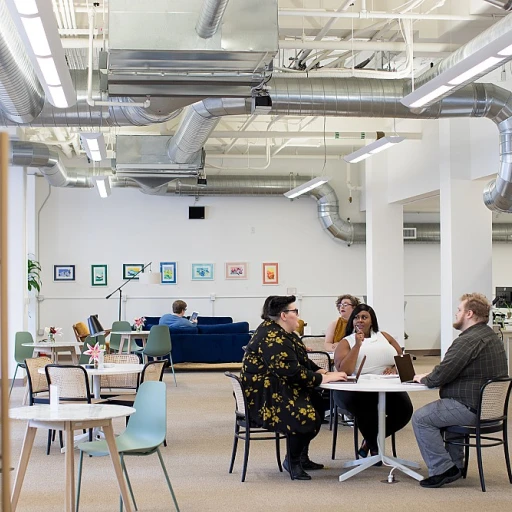-teaser.webp)
The Importance of Specialized Staffing in Pharmaceuticals
Why Specialized Talent Matters in Pharma Staffing
The pharmaceutical industry operates within a complex network requiring unique skill sets. The need for specialized staffing solutions in this sector cannot be overstated, as it plays a crucial role in maintaining the balance between innovation and compliance. Organizations within the pharmaceutical industry must continually adapt to evolving regulations, market demands, and technological advancements. This adaptation hinges significantly on having the right expertise in various roles, such as regulatory affairs, clinical development, and drug development.
As companies strive to innovate and bring new drugs to the market, the hiring process becomes increasingly competitive. Identifying and attracting top talent is essential. This demand is evident in roles that span across the entire lifecycle of pharmaceuticals, from research and development to manufacturing and commercial execution. Pharmaceutical recruiting focuses not only on filling existing positions but also on anticipating future needs, ensuring that businesses can sustain growth and operational efficiency.
Adapting to Industry-Specific Needs
Understanding industry-specific nuances is essential for any staffing strategy in the pharmaceutical sector. For instance, recruiting for entry-level positions in pharmaceutical sales requires a different approach from staffing for specialized roles like medical device development. The subtle differences in job descriptions and career development paths demand a tailored recruiting strategy to pinpoint the right candidates.
Furthermore, the talent search within life sciences necessitates a thorough understanding of the clinical trials and clinical sciences processes. Companies must ensure compliance while remaining competitive in recruiting high-caliber candidates. An effective staffing process enables pharmaceutical companies to navigate these challenges efficiently.
Achieving Efficient Recruitment Processes
The pharmaceutical staffing process is an intricate dance involving multiple steps, from job search to recruitment and eventual hiring. The strategic placement of candidates in roles that align with their capabilities and the company’s strategic objectives is vital. Although sourcing candidates with the right qualifications and experience is daunting, it is crucial for the success of pharma companies.”
For those tasked with workforce planning in this sector, enhancing the hiring process with effective talent solutions is key. Integrating spend analysis and effective workforce planning tools can positively impact how companies manage and optimize their staffing strategies. For more insights, consider reading more on enhancing workforce planning with effective spend analysis services.
Challenges in Pharmaceutical Workforce Planning
Overcoming Workforce Hurdles in Pharmaceuticals
The pharmaceutical industry encounters a multitude of challenges when it comes to workforce planning, influenced by the ever-evolving landscape of clinical sciences, regulatory affairs, and medical device advancements. Understanding these obstacles is essential for pharmaceutical companies striving to maintain top talent in their workforce. The complexities involved in drug development, clinical trials, and various specialized roles demand a strategic approach. The highly regulated environment requires precise recruitment processes to find candidates with specific qualifications and expertise. This often varies from regulatory, executive recruiter roles to more technical positions in clinical development, further complicating the hiring process. Moreover, the industry's rapid growth and innovation pace create an insatiable demand for skilled professionals. Pharmaceutical sales roles, for instance, necessitate individuals familiar not just with selling techniques, but also with the intricate details of the pharmaceuticals they're promoting. Life sciences and pharma executives need to precisely pinpoint pharma recruitment requirements. Thus, the need for adaptable recruitment strategies becomes paramount. For many organizations, the primary bottleneck lies in identifying and attracting the right talent efficiently. The search for candidates equipped to step into various entry-level and senior roles can be overwhelming, considering the industry's specialized nature. Pharmaceutical companies are increasingly turning towards talent solutions that focus on precision and adaptability in staffing. Executive recruiters and staffing agencies play a pivotal role in navigating the complexities of pharmaceutical recruiting, identifying tailored solutions that align with both immediate and long-term workforce needs. This strategic movement towards refining the recruitment process not only addresses workforce gaps but also ensures a sustainable pipeline of skilled professionals ready to contribute to future developments. For more insights on how to effectively address workforce challenges within the pharmaceutical industry, consider exploring optimizing IT resource allocation for effective workforce planning. Understanding the interplay of technology and recruitment processes can further enhance pharmaceutical staffing strategies, leading to more impactful outcomes.How Pharmaceutical Staffing Agencies Address Workforce Gaps
### Addressing Workforce Gaps in the Pharmaceutical Sector In the pharmaceutical industry, staffing agencies play a pivotal role in bridging the gap between demand and supply of skilled professionals. This sector, marked by its intricate blend of science and business, requires an expansive range of talent, from clinical roles to executive positions in pharmaceutical sales. Pharmaceutical staffing agencies specialize in identifying and recruiting the right talent for specific roles. With the complexity of drug development and regulatory affairs, these agencies focus on providing solutions tailored to meet the precise needs of pharmaceutical companies. Here is how these agencies contribute:- Recruitment of Specialized Talent: The process of recruiting in this industry is meticulous, with job descriptions requiring both clinical expertise and industry knowledge. Staffing agencies streamline this process by maintaining a pool of pre-screened candidates, from entry level to experienced professionals.
- Speed and Efficiency: With their vast network and resources, staffing agencies expedite the hiring process. Whether it’s finding a medical device specialist or a clinical trials expert, agencies ensure a swift recruitment process, reducing downtime and enhancing development timelines.
- Access to Top Talent: Agencies are adept at conducting a targeted job search for top talent. This involves executive recruiting for key roles that require unique skills and experience, ingraining a competitive edge into pharma operations.
- Adapting to Market Demands: As the pharmaceutical industry evolves, so do the demands for regulatory expertise and clinical development roles. Staffing agencies continuously adjust their talent solutions to align with emerging trends, ensuring pharmaceutical companies remain proactive rather than reactive.
The Role of Technology in Staffing Solutions
Advancing the Recruitment Process with Technology
In the dynamic pharmaceutical industry, technology plays a pivotal role in driving staffing solutions forward. The hiring process in pharmaceuticals is increasingly relying on advanced technologies to streamline recruitment and ensure the engagement of top talent in clinical and life sciences roles. With digital tools, pharmaceutical companies can enhance their job search processes and efficiently pinpoint pharma-specific candidates. One of the major advancements is the use of AI and machine learning algorithms in pharmaceutical recruitment. These technologies help recruiters analyze vast amounts of data to identify potential candidates faster than traditional methods. This is crucial in an industry where time-sensitive roles such as those in clinical trials or drug development require prompt placement of skilled experts. Moreover, digital platforms provide staff with tools to improve their recruiting processes. These platforms facilitate interactions between recruiters and candidates, making the recruitment process more transparent and interactive, which is particularly beneficial for entry-level positions and executive recruiter searches alike. The rise of remote work and virtual interviews driven by technological advancement also supports the rapid hiring process required in the pharmaceutical sector. Virtual interviews have become a staple practice, not only reducing logistical challenges but also widening the talent pool, encompassing both local and global candidates. Additionally, technologies like Applicant Tracking Systems (ATS) streamline the management of job applications, helping to arrive at a swift and effective selection process. This advancement is crucial for roles requiring quick action, such as those in pharmaceutical sales, regulatory affairs, or the medical device sector. Meanwhile, automation is becoming increasingly involved in the scheduling and coordination aspects of the recruitment process. Such solutions significantly reduce administrative burden, allowing pharmaceutical staffing agencies to focus on candidate quality and development within the job market. As pharmaceutical companies continue to evolve, integrating cutting-edge technology in staffing remains indispensable for navigating the complexities and challenges of contemporary workforce planning, ensuring that the pharmaceutical industry attracts and retains the best talent available.Case Studies: Successful Staffing Solutions in Pharmaceuticals
In-depth Look at Successful Staffing Solutions in Pharma
In the dynamic landscape of the pharmaceutical industry, effective workforce planning is critical to ensuring that pharmacy companies remain competitive and innovative. Several case studies highlight how pharmaceutical staffing agencies have successfully addressed workforce gaps through targeted recruitment and talent solutions. One notable example is seen in the field of clinical sciences. Here, staffing agencies efficiently bridge the gap during complex clinical trials. By providing highly qualified candidates tailored to specific roles, agencies contribute significantly to the advancement of drug development processes. This adaptability has ensured timely progress in critical pharmaceutical projects, underscoring the importance of specialized staffing. Another case involves the development of a new medical device. When rapid hiring was necessary to maintain project timelines, a particular agency leveraged its strong network and pinpoint pharma talent searching capabilities. The agency successfully filled multiple roles at both entry and executive levels, showcasing the efficacy of targeted recruiting and precise job descriptions in expediting the hiring process. In pharmaceutical sales and recruitment, tailored staffing solutions have been integral in overcoming recruitment challenges. Agencies have assisted in the search for top pharmaceutical talent with a focus on regulatory affairs, ensuring compliance with ever-evolving industry standards. These agencies' ability to align candidates' expertise with the cultural and operational needs of pharma companies demonstrates a nuanced understanding of the complex life sciences environment. Through strategic partnerships with expert pharmaceutical recruiters, organizations have enhanced their hiring processes, thus boosting the development of effective career pharmaceuticals. These successful case studies collectively reflect the invaluable role that dedicated staffing agencies play in gearing the pharmaceutical workforce toward sustainable growth and innovation.Future Trends in Pharmaceutical Staffing
Anticipating Future Trends in Pharmaceutical Staffing
As the pharmaceutical landscape evolves, so does the need for dynamic workforce planning strategies. Keeping an eye on emerging trends is essential for pharmaceutical companies aiming to maintain a competitive edge, particularly when it comes to recruiting top talent. Here are some key trends influencing the staffing landscape in this sector:- Increased Focus on Digital Transformation: The integration of technology is rapidly shaping recruitment procedures, facilitating the identification and hiring of specialized roles. As discussed earlier, technology plays a pivotal role in pinpointing pharma talent, making the hiring process more efficient.
- Emphasis on Soft Skills and Cultural Fit: Beyond technical expertise, pharmaceutical staffing solutions increasingly prioritize candidates' soft skills and cultural alignment. This shift reflects an understanding that a successful hire is one who fits seamlessly into the organizational culture while excelling in their role.
- Expansion of Remote Work Options: The life sciences industry is gradually adapting to remote or hybrid work models. This flexibility is especially relevant for roles in clinical development and research, allowing companies to tap into a broader talent pool that may not be bound by geographical limitations.
- Rise of Contract and Temporary Positions: With the impermanent nature of many clinical trials and regulatory projects, there's a growing reliance on temporary staffing. This trend underscores the importance of agile staffing strategies that can adapt to the fluctuating demands of the drug development cycle.
- Focus on Diversity and Inclusion: There's a heightened awareness about fostering a diverse workforce within the pharmaceutical industry. By embracing diversity, companies are better equipped to innovate and address a broader range of medical challenges.














